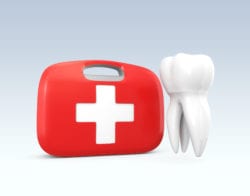If you are experiencing a dental emergency and it is during regular office hours, contact us at (847) 920–7193.
We try our best to respond to all dental emergencies as quickly as possible. We set aside time each day to treat patients with emergency dental needs. Please call our Fox Lake Dentist office as early in the day as possible so that we can work you into our schedule.
Dental Emergency Care
Dental emergencies or pain in the mouth should not be ignored. Addressing any problems immediately will prevent permanent or costly damage. Common dental emergencies include toothache, pain in the teeth, jaw or gums, broken teeth, knocked out teeth, broken fillings, and swelling in the gums or mouth.
WHAT TO DO IF YOU HAVE A….
Knocked-out tooth – Contact us immediately. Retrieve the tooth, if possible, holding it by the crown (the part that is usually exposed in the mouth). If the tooth is dirty, rinse the root in water, but do not scrub or remove attached tissue fragments. Knocked-out teeth have the highest survival rate if they are returned to the socket within one hour of being knocked out.
Lost Filling or Crown – Contact us as soon as possible. Do not use temporary measures to replace the dental filling or re-cement the dental crown. An over-the-counter pain reliever such as aspirin may ease discomfort.
Toothache – Contact us as soon as possible. Toothaches are caused by several things. First, try rinsing your mouth with warm water or flossing to remove any lodged food. If you are experiencing swelling in the surrounding tissue, a cold compress may be applied to the outside of the mouth or cheek.
Abscess – Contact us immediately. An abscess is a serious condition that can worsen with time and spread the infection to the rest of your body. Rinsing with a mild saltwater solution may help ease discomfort and draw the pus to the surface of the gum tissue.
Preventing Dental Emergencies
Dental emergencies can occur at any time and impact people of all ages. Trauma is the common cause of dental emergencies, but there are ways to help prevent the sudden onset of infection or to reduce your risk for damaged teeth.
Dr. Prendergast will alert you to any risk factors you may have for dental problems that should be addressed with treatment for specific oral hygiene products during routine dental visits. Regular dental care is important and can help you avoid infection or sudden tooth pain as a result of infection or damage.
We also recommend the use of a custom-fit sports mouthguard for both children and adults. Contact sports can put anyone at risk for tooth damage or even a knocked-out tooth. Custom sports mouthguards are designed to protect your teeth and gums from blows to the face while participating in sports. They will remain firmly in place during any fast-paced sporting event. Dr. Prendergast can fit patients of all ages for a custom mouthguard for sports.
While this doesn’t prevent emergencies, when they happen, it’s nice to be prepared. Putting together a dental emergency kit can help makes things go smoothly. Pack together things like Orajel, ibuprofen, sterile gloves, cotton, and gauze in case something happens. If you know you have these things on hand and you’re ready to handle an emergency, it can help you keep calm in the moment when it does happen.
Emergency Dentistry FAQs
Can I visit the ER if I have a dental emergency?
We will recommend visiting the hospital if you have physical injuries in addition to your dental injuries. You can also visit the ER if you cannot reach our office but have extreme pain, tooth damage, or gum injuries.
Why does my tooth hurt so badly?
A dental injury or tooth decay can hit or expose the tooth’s nerves. Your tooth nerves are within the tooth chamber inside of the tooth. A hit to your tooth or harmful bacteria that enter your tooth can create pain because of the nerves.
Are bleeding gums a dental emergency?
If your gums bleed when you brush your teeth, you likely have gum inflammation or gingivitis. Gingivitis will require dental care but is not an emergency. However, if you cut or damage your gums and they are bleeding without stopping, you will require emergency dental care. Before you visit, use a clean cloth or gauze to apply pressure to stop the bleeding.
How do I know if I have a tooth abscess?
Symptoms of a tooth abscess include:
- Tooth sensitivity to hot and cold
- Throbbing tooth pain
- Tooth pain when biting and chewing
- Swelling surrounding a tooth
- Fever
Contact us for emergency care if you have severe tooth pain and suspect an abscess.
What happens if a dentist can’t reattach my lost tooth?
We will recommend a dental implant or bridge to replace your lost tooth. Traditional dental bridges may be less intensive than dental implants, but dental implants last longer and replace teeth at the root. We’ll work with you to determine which restoration fits your dental needs.
What is the best treatment for a broken tooth?
The extent of your tooth damage, the area of your tooth damage, and your specific budget and goals are factors we consider before recommending restorative or cosmetic treatment. Dental crowns fully cover teeth like caps and are best for molars and premolars. A tooth bonding treatment can cover chips and cracks in the tooth enamel. Fillings can also address damage within the tooth.

